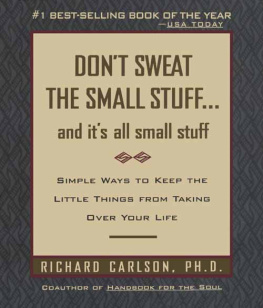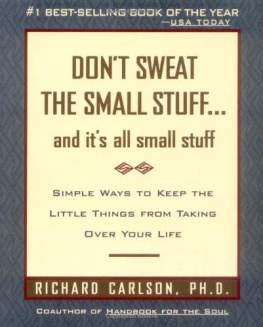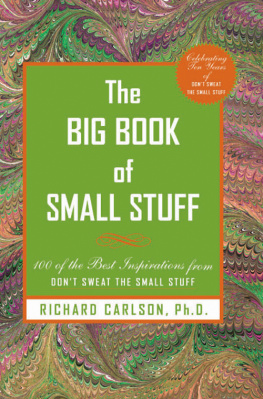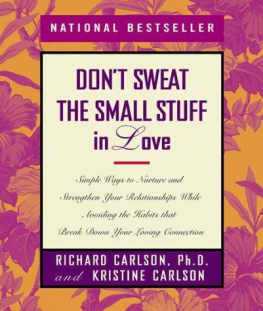I dedicate this book to my daughters, Jazzy and Kenna, who remind me every day how important it is to remember not to sweat the small stuff. I love you both so much. Thank you for being just the way you are.
The greatest discovery of my generation is that a human being can alter his life by altering his attitude.
WILLIAM JAMES
W henever were dealing with bad news, a difficult person, or a disappointment of some kind, most of us get into certain habits, ways of reacting to lifeparticularly adversitythat dont serve us very well. We overreact, blow things out of proportion, hold on too tightly, and focus on the negative aspects of life. When we are immobilized by little thingswhen we are irritated, annoyed, and easily botheredour (over-) reactions not only make us frustrated but actually get in the way of getting what we want. We lose sight of the bigger picture, focus on the negative, and annoy other people who might otherwise help us. In short, we live our lives as if they were one great big emergency! We often rush around looking busy, trying to solve problems, but in reality, we are often compounding them. Because everything seems like such a big deal, we end up spending our lives dealing with one drama after another.
After a while, we begin to believe that everything really is a big deal. We fail to recognize that the way we relate to our problems has a lot to do with how quickly and efficiently we solve them. As I hope you will soon discover, when you learn the habit of responding to life with more ease, problems that seemed insurmountable will begin to seem more manageable. And even the biggies, things that are truly stressful, wont throw you off track as much as they once did.
Happily, there is another way to relate to lifea softer, more graceful path that makes life seem easier and the people in it more compatible. This other way of living involves replacing old habits of reaction with new habits of perspective. These new habits enable us to have richer, more satisfying lives.
Id like to share a personal story that touched my heart and reinforced an important lessona story that demonstrates the essential message of this book. As you will see, the events of this story planted the seed for the title of the book you are about to read.
About a year ago a foreign publisher contacted me and requested that I attempt to get an endorsement from best-selling author Dr. Wayne Dyer for a foreign edition of my book You Can Feel Good Again. I told them that while Dr. Dyer had given me an endorsement for an earlier book, I had no idea whether or not he would consider doing so again. I told them, however, that I would try.
As is often the case in the publishing world, I sent out my request, but did not hear back. After some time had gone by, I came to the conclusion that Dr. Dyer was either too busy or unwilling to write an endorsement. I honored this decision and let the publisher know that we wouldnt be able to use his name to promote the book. I considered the case closed.
About six months later, however, I received a copy of the foreign edition and to my surprise, right on the cover was the old endorsement for the earlier book from Dr. Dyer! Despite my specific instructions to the contrary, the foreign publisher had used his earlier quote and transferred it to the new book. I was extremely upset, and worried about the implications as well as the possible consequences. I called my literary agent, who immediately contacted the publisher and demanded that the books be taken off the shelves.
In the meantime, I decided to write Dr. Dyer an apology, explaining the situation and all that was being done to rectify the problem. After a few weeks of wondering about what his response might be, I received a letter in the mail that said the following: Richard. There are two rules for living in harmony. #1) Dont sweat the small stuff and #2) Its all small stuff. Let the quote stand. Love, Wayne.
That was it! No lectures, no threats. No hard feelings and no confrontation. Despite the obvious unethical use of his very famous name, he responded with grace and humility; no feathers ruffled. His response demonstrated the important concepts of going with the flow, and of learning to respond to life gracefully, with ease.
For more than a decade I have worked with clients, helping them to approach life in this more accepting way. Together, we deal with all types of issuesstress, relationship problems, work-related issues, addictions, and general frustration.
In this book, I will share with you very specific strategiesthings you can start doing todaythat will help you respond to life more gracefully. The strategies you are going to read about are the ones that have proven themselves to be the most successful by clients and readers of mine over the years. They also represent the way I like to approach my own life: the path of least resistance. Each strategy is simple, yet powerful, and will act as a navigational guide to point you in the direction of greater perspective and more relaxed living. Youll find that many of the strategies will apply not only to isolated events but to many of lifes most difficult challenges.
When you dont sweat the small stuff, your life wont be perfect, but you will learn to accept what life has to offer with far less resistance. As we learn in the Zen philosophy, when you learn to let go of problems instead of resisting with all your might, your life will begin to flow. You will, as the serenity prayer suggests, Change the things that can be changed, accept those that cannot, and have the wisdom to know the difference. Im confident that if you give these strategies a try, you will learn the two rules of harmony. #1) Dont sweat the small stuff, and #2) Its all small stuff. As you incorporate these ideas into your life you will begin to create a more peaceful and loving you.
1.
Dont Sweat the Small Stuff
O ften we allow ourselves to get all worked up about things that, upon closer examination, arent really that big a deal. We focus on little problems and concerns and blow them way out of proportion. A stranger, for example, might cut in front of us in traffic. Rather than let it go, and go on with our day, we convince ourselves that we are justified in our anger. We play out an imaginary confrontation in our mind. Many of us might even tell someone else about the incident later on rather than simply let it go.
Why not instead simply allow the driver to have his accident somewhere else? Try to have compassion for the person and remember how painful it is to be in such an enormous hurry. This way, we can maintain our own sense of well-being and avoid taking other peoples problems personally.
There are many similar, small stuff examples that occur every day in our lives. Whether we had to wait in line, listen to unfair criticism, or do the lions share of the work, it pays enormous dividends if we learn not to worry about little things. So many people spend so much of their life energy sweating the small stuff that they completely lose touch with the magic and beauty of life. When you commit to working toward this goal you will find that you will have far more energy to be kinder and gentler.
2.
Make Peace with Imperfection
I ve yet to meet an absolute perfectionist whose life was filled with inner peace. The need for perfection and the desire for inner tranquility conflict with each other. Whenever we are attached to having something a certain way, better than it already is, we are, almost by definition, engaged in a losing battle. Rather than being content and grateful for what we have, we are focused on whats wrong with something and our need to fix it. When we are zeroed in on whats wrong, it implies that we are dissatisfied, discontent.









